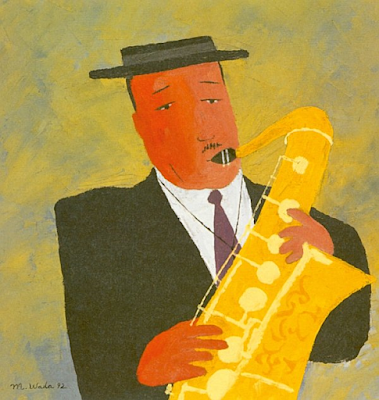palabras de Haruki Murakami / ilustración de Makoto Wada
Supongo que no habrá discrepancias si afirmo que Lester Young, Coleman Hawkins y Ben Webster fueron los tres grandes saxofonistas tenores antes de la llegada del bebop. El fraseo temerario y ambicioso de Hawkins; el poético de Webster, meloso y directo, además de equilibrado; el lirismo suave pero atrevido de Young, de vuelos más libres..., todos ellos han resistido el paso del tiempo. Sin embargo, entre Hawkins, Webster y Young, me quedo con este último, con diferencia.
Reparé en Lester Young por primera vez en un disco de Billie Holiday, editado por el sello Colombia en la segunda mitad de los años treinta. Los solos de Young en dicha grabación son soberbios, no hay discusión al respecto. Buscando entre los créditos, descubrí que el acompañamiento corría a cargo de la banda de Count Basie, y entre sus miembros —todos ellos músicos extraordinarios— quien se encargaba de los solos de saxo tenor era Lester Young.
Basta con escucharlo para comprender lo que digo. Era la época de las big bands, y no había saxo tenor que no tocara a pleno pulmón para destacar sobre todos los demás instrumentos. Lester Young era una excepción a la norma: tocaba con suavidad y delicadeza, con sentimiento, en definitiva, como si le estuviera hablando a uno personalmente. Rebasaba los patrones rítmicos establecidos y ampliaba los horizontes del jazz, en perfecta sintonía con lo que Billie Holiday estaba haciendo en el terreno del jazz vocal. Por desgracia, dicha ruptura con el modo en que hasta entonces se interpretaba dentro del jazz tuvo consecuencias para ambos. Ninguno de los dos poseía la entereza mental para soportar la presión que su propia originalidad les causó en la escena jazzística.
Así pues, pienso que la conmovedora colaboración entre Lester Young y Billie Holiday constituye el mejor legado musical del saxo tenor, pero, puesto que ya he seleccionado el mencionado disco en el capítulo dedicado a Holiday, voy a quedarme aquí con una grabación muy posterior: Pres and Teddy, un disco publicado por el sello Verve. Casualmente, también Teddy Wilson acompañó durante mucho tiempo a Billie Holiday y tuvo un papel relevante. Las grabaciones de Young para la Verve fueron, en general, desiguales en calidad, pero las dos sesiones de enero de 1956 en las que se reunió con Teddy Wilson para tocar, y que fueron inmortalizadas en Pres and Teddy y Jazz Giants ’56, no tienen desperdicio. Todos los temas son magníficos. Es imposible olvidar la cálida y colorida interpretación de Lester en la balada «Louis». Uno tiene la impresión de que la música lo atraviesa y fluye por todo su cuerpo, y se transmite al espacio circundante.
«Su música era extraordinaria, pero el instrumento con el que tocaba era... una aberración», dijo alguien sobre él, recordándolo. «No solo era barato, sino que además estaba plagado de gomas elásticas y piezas sujetas con pegamento y chicle. ¿Cómo era posible que una música tan asombrosa naciera de algo así?» De las anécdotas que se cuentan acerca de Lester Young, esta es quizás la que más me gusta. Sí, es esta, con seguridad.
Reparé en Lester Young por primera vez en un disco de Billie Holiday, editado por el sello Colombia en la segunda mitad de los años treinta. Los solos de Young en dicha grabación son soberbios, no hay discusión al respecto. Buscando entre los créditos, descubrí que el acompañamiento corría a cargo de la banda de Count Basie, y entre sus miembros —todos ellos músicos extraordinarios— quien se encargaba de los solos de saxo tenor era Lester Young.
Basta con escucharlo para comprender lo que digo. Era la época de las big bands, y no había saxo tenor que no tocara a pleno pulmón para destacar sobre todos los demás instrumentos. Lester Young era una excepción a la norma: tocaba con suavidad y delicadeza, con sentimiento, en definitiva, como si le estuviera hablando a uno personalmente. Rebasaba los patrones rítmicos establecidos y ampliaba los horizontes del jazz, en perfecta sintonía con lo que Billie Holiday estaba haciendo en el terreno del jazz vocal. Por desgracia, dicha ruptura con el modo en que hasta entonces se interpretaba dentro del jazz tuvo consecuencias para ambos. Ninguno de los dos poseía la entereza mental para soportar la presión que su propia originalidad les causó en la escena jazzística.
Así pues, pienso que la conmovedora colaboración entre Lester Young y Billie Holiday constituye el mejor legado musical del saxo tenor, pero, puesto que ya he seleccionado el mencionado disco en el capítulo dedicado a Holiday, voy a quedarme aquí con una grabación muy posterior: Pres and Teddy, un disco publicado por el sello Verve. Casualmente, también Teddy Wilson acompañó durante mucho tiempo a Billie Holiday y tuvo un papel relevante. Las grabaciones de Young para la Verve fueron, en general, desiguales en calidad, pero las dos sesiones de enero de 1956 en las que se reunió con Teddy Wilson para tocar, y que fueron inmortalizadas en Pres and Teddy y Jazz Giants ’56, no tienen desperdicio. Todos los temas son magníficos. Es imposible olvidar la cálida y colorida interpretación de Lester en la balada «Louis». Uno tiene la impresión de que la música lo atraviesa y fluye por todo su cuerpo, y se transmite al espacio circundante.
«Su música era extraordinaria, pero el instrumento con el que tocaba era... una aberración», dijo alguien sobre él, recordándolo. «No solo era barato, sino que además estaba plagado de gomas elásticas y piezas sujetas con pegamento y chicle. ¿Cómo era posible que una música tan asombrosa naciera de algo así?» De las anécdotas que se cuentan acerca de Lester Young, esta es quizás la que más me gusta. Sí, es esta, con seguridad.






















.jpg)



